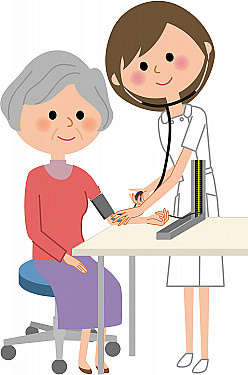
High blood pressure at the doctor's office but not at home? – Harvard Health
Strong legs help power summer activities: Hiking, biking, swimming, and more
Sexually transmitted infections: What parents need to be sure their teens know
Have you exfoliated lately?
Wildfires: How to cope when smoke affects air quality and health
PTSD: How is treatment changing?
Virtual mental health care visits: Making them work for you
How healthy is sugar alcohol?
A bird flu primer: What to know and do
New urine test may help some men with elevated PSA avoid biopsy
Dupuytren’s contracture of the hand
Heart Health Medical appointments make most people feel at least a little bit anxious. But for some, that stress may trigger a temporary rise in blood pressure. If their blood pressure is normal at home and in other nonmedical settings, they have what’s known as white-coat hypertension.
Medical appointments make most people feel at least a little bit anxious. But for some, that stress may trigger a temporary rise in blood pressure. If their blood pressure is normal at home and in other nonmedical settings, they have what’s known as white-coat hypertension.
Now, a large study suggests that people with this condition face a greater threat of heart disease than people whose blood pressure readings are always normal. Normal blood pressure is defined as less than 120/80, whereas high blood pressure is 130/80 and higher.
“If your blood pressure goes up under the relatively nonthreatening situation of seeing a doctor, then what might happen if you’re cut off on the highway, or experience a challenging family or work circumstance?” says Dr. Randall Zusman, a cardiologist at Harvard-affiliated Massachusetts General Hospital. Everyone’s blood pressure fluctuates constantly throughout the day. But people with white-coat hypertension may experience more frequent and higher spikes. About one in five people has the condition, which doctors typically don’t treat with medication.
For the study, researchers pooled findings from 27 studies involving more than 64,000 people in the United States, Europe, and Asia. Compared with people whose blood pressure was normal both at the doctor’s office and at home, people with untreated white-coat hypertension had a 36% higher risk of heart attack, stroke, and other heart-related events. They were also twice as likely to die from heart disease.
However, people using blood pressure medication whose blood pressure still rose at the doctor’s office (a phenomenon known as the white-coat effect) did not have a higher risk of heart disease. The study was published June 10 in Annals of Internal Medicine.
According to Dr. Zusman, the findings lend further support for treating people with white-coat hypertension. Research suggests that the condition nearly always progresses to sustained high blood pressure.
If the notion that you can lower your blood pressure by sitting quietly and calming your mind sounds like hocus-pocus, you’re not alone. “I was pretty skeptical myself,” says Dr. Randall Zusman, associate professor of medicine at Harvard Medical School.
But after collaborating on several studies with Dr. Herbert Benson, Harvard professor of mind-body medicine, Dr. Zusman is now a big fan of the technique, known as the relaxation response. Coined by Dr. Benson some 40 years ago, the term refers to the slowed breathing, lowered heart rate, and other physiological changes that occur during states of relaxation. Their research, which has included people with both treated and untreated high blood pressure, shows that regularly invoking the relaxation response can lower blood pressure.
Not everyone responds to the technique, but among responders, researchers documented genetic changes that may explain the benefit. “The relaxation response turns on genes involved in dilating the blood vessels and turns off genes associated with vascular inflammation and constriction,” says Dr. Zusman.
To practice the relaxation response, sit in a quiet place with your eyes closed. Relax your muscles and silently repeat a word, phrase, or short prayer of your choosing over and over. When stray thoughts interfere, let them come and go. Return to your word, phrase, or sound. Ideally, you should practice for 10 to 20 minutes every day, but even a few minutes can help.
Treatment doesn’t necessarily mean taking medication, however. “Losing weight, exercising, limiting salt, and not smoking are all associated with better blood pressure control. I certainly encourage people to do all those things, whether they have intermittent or sustained high blood pressure,” says Dr. Zusman. Another habit that may be especially helpful for people with white-coat hypertension is practicing the relaxation response (see “Relax your mind, body, and blood vessels?”).
But if lifestyle changes can’t bring your blood pressure down to a normal range, there are many different safe, effective medications that can help. Dr. Zusman advises all of his patients to use a home blood pressure monitor to make sure their treatment is working. “I also have them bring their device in and watch them take their blood pressure to make sure they’re using the monitor correctly,” he says. Doctors often suggest checking your blood pressure once or twice a day for a week or so right after starting or changing medications. After that, two to three times a week at different times of the day is a good idea, says Dr. Zusman.
Image: © studiolaut/Getty Images
Deepak L. Bhatt, M.D., M.P.H, Former Editor in Chief, Harvard Heart Letter
As a service to our readers, Harvard Health Publishing provides access to our library of archived content. Please note the date of last review or update on all articles.
No content on this site, regardless of date, should ever be used as a substitute for direct medical advice from your doctor or other qualified clinician.
Strong legs help power summer activities: Hiking, biking, swimming, and more
Sexually transmitted infections: What parents need to be sure their teens know
Have you exfoliated lately?
Wildfires: How to cope when smoke affects air quality and health
PTSD: How is treatment changing?
Virtual mental health care visits: Making them work for you
How healthy is sugar alcohol?
A bird flu primer: What to know and do
New urine test may help some men with elevated PSA avoid biopsy
Dupuytren’s contracture of the hand
Get the latest in health news delivered to your inbox!
© 2024 Harvard Health Publishing® of The President and Fellows of Harvard College
Do not sell my personal information | Privacy Policy and Terms of Use
Thanks for visiting. Don’t miss your FREE gift.
The Best Diets for Cognitive Fitness, is yours absolutely FREE when you sign up to receive Health Alerts from Harvard Medical School
Sign up to get tips for living a healthy lifestyle, with ways to fight inflammation and improve cognitive health, plus the latest advances in preventative medicine, diet and exercise, pain relief, blood pressure and cholesterol management, and more.
Health Alerts from Harvard Medical School
Get helpful tips and guidance for everything from fighting inflammation to finding the best diets for weight loss…from exercises to build a stronger core to advice on treating cataracts. PLUS, the latest news on medical advances and breakthroughs from Harvard Medical School experts.
BONUS! Sign up now and
get a FREE copy of the
Best Diets for Cognitive Fitness
Stay on top of latest health news from Harvard Medical School.
Plus, get a FREE copy of the Best Diets for Cognitive Fitness.

